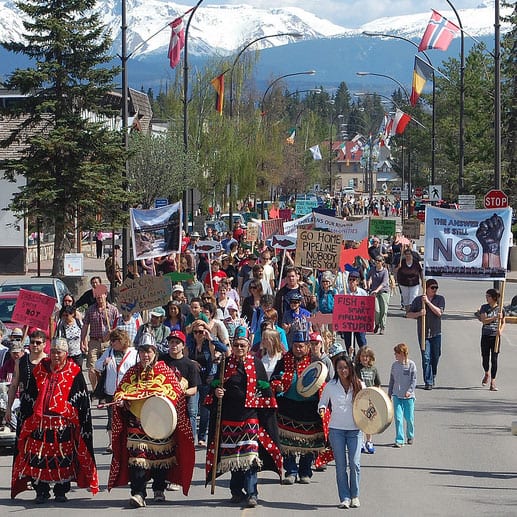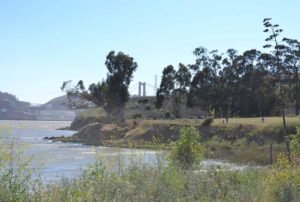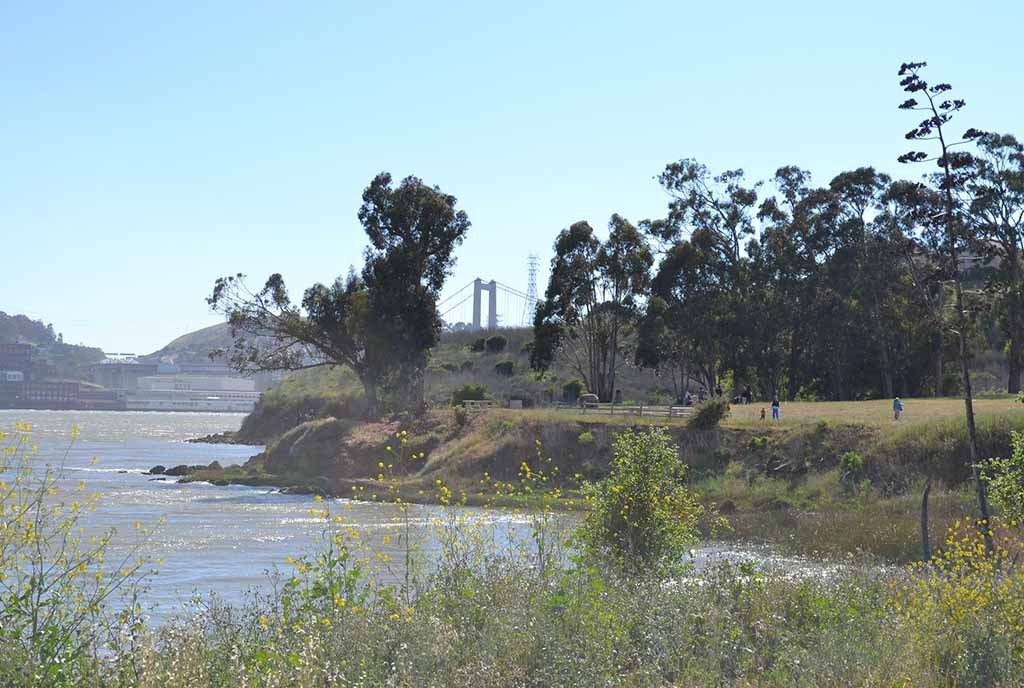
January 8, 2019; Popular Resistance, Canadian Broadcasting Company, and The Conversation
Since 2015, Truth and Reconciliation has been a central theme of official federal Canadian First Nations policy and has had a profound cultural influence, as NPQ covered last November. But when it comes to control of energy resources…well, maybe not so much.
It would appear that the Canadian government is engaging in double talk that surely will seem highly familiar for readers south of the 49th parallel. Jeffrey Ansloos, a professor of indigenous mental health and social policy at the University of Toronto, writing in Maclean’s, pointed to some of the shortfalls in 2017. The governing Liberal Party, Ansloos observes, likes to:
talk about reconciliation [but] their version precludes questioning the legitimacy of the Canadian state that has been in perpetual violation of its own treaties since Confederation. Liberal recognition takes pride in Indigenous representation to ensure that the cabinet “looks like Canada,” while ignoring Indigenous governance and instead favoring tepid consultation with federally structured band councils…
A case in point emerged this week in British Columbia when Gidumt’en Checkpoint, a camp of the Wet’suwet’en people, was raided by the Royal Canadian Mounted Police (known as the RCMP, or Mounties). The checkpoint blocks a fracked gas company from building a pipeline through Native territory.
The Wet’suwet’en are a group of First Nations clans in British Columbia that never ceded their lands to Canada via treaty, as was declared by Canada’s Supreme Court in 1997. All five clans have opposed a proposal by Coastal GasLink, a project of TransCanada Corporation, to build a fracked gas pipeline through their territory.
TransCanada says it has signed agreements with elected officials of the 20 First Nations groups along the pipeline’s route, but the Wet’suwet’en are not governed by elected officials; they are governed by hereditary tribal elders. (One thinks of the parallel situation in British-governed Kenya, when colonial administrators appointed “chiefs” of indigenous groups whose authority had no basis in those nations’ governance structures.) Those elders have rejected the Coastal GasLink pipeline.
The Unist’ot’en of the Gilseyhu clan say they erected the Gidumt’en checkpoint seven years ago on the area of the planned pipeline. On Friday, a BC Supreme Court justice issued an amended injunction authorizing the RCMP to clear the path for the pipeline. The defendants (the First Nations people on their own land) have until January 31 to file a response, and until then, the court says they are prohibited from interfering with pipeline business.
In Tuesday’s raid, the RCMP arrested 14 people at the checkpoint.
BC Premier John Horgan compared natural gas extraction project to the “moon landing” in terms of its potential benefits to an “economically deprived region.” It is the single largest private-sector investment in Canada’s history.
Sign up for our free newsletters
Subscribe to NPQ's newsletters to have our top stories delivered directly to your inbox.
By signing up, you agree to our privacy policy and terms of use, and to receive messages from NPQ and our partners.
A report by Jeffrey Monaghan of Carleton University and Miles Howe of Queen’s University in the Canadian Journal of Sociology revealed starkly how the Canadian authorities view indigenous protestors. According to Justin Brake of National News, “Monaghan and Crosby used access to information laws to uncover thousands of pages of documents from the RCMP, CSIS and government agencies.” The report revealed that the Canadian authorities evaluate First Nations protestors not on potential or demonstrated “criminality” but on their ability to mobilize public support. In other words, the government judges its response to land justice movements based upon how bad the protestors can make them look. Brake writes,
It also shows the government’s risk assessments of Indigenous protests, court injunctions initiated by private corporations against Indigenous people, and RCMP policing tactics all favor corporate interests and private property rights over Indigenous rights and title.
This includes the current resistance by land defenders and hereditary chiefs to the Coastal GasLink LNG pipeline slated to run through unceded Wet’suwet’en territory.
A statement by the protestors at the Gidumt’en access point, which can and should be read in full here, says,
The RCMP’s ultimatum, to allow TransCanada access to unceded Wet’suwet’en territory or face police invasion, is an act of war. Despite the lip service given to “Truth and Reconciliation,” Canada is now attempting to do what it has always done—criminalize and use violence against indigenous people so that their unceded homelands can be exploited for profit.
The protestors and other First Nations people who were present moved back into Unist’ot’en territory, which is now blocked off by the RCMP’s own blockade. The Unist’ot’en Clan of the Wet’suwet’en stated,
The Unist’ot’en homestead is not a protest or demonstration. Our clan is occupying and using our traditional territory as it has for centuries. Our free prior and informed consent protocol is in place at the entrance of or territory as an expression of our jurisdiction and our inherent right to both give and refuse consent. Our homestead is a peaceful expression of our connection to our territory. It is also an example of the continuous use and occupation of our territory of our territory by our clan. Our traditional structures of governance continue to dictate the proper use of and access to our lands and water.
This is an excellent example of how the language used to describe the situation can affect what happens on the ground. The Wet’suwet’en people reiterate that they are continuing as they have always done, that their government has not been consulted, that proper procedures must be observed. The BC government and RCMP describe them as protestors, activists, and as obstructing the legal business of private enterprise and the state. Leah Temper, a researcher associate at McGill University, writes, “Their approach of asserting responsibility to the land and the fish rather than demanding rights from the state, land-based healing of colonial trauma and reinvigoration of Indigenous laws and protocols are an inspiration for land defenders and climate justice activists in Canada and around the world.”
First Nations and others around Canada have demonstrated their support of the Wet’suwet’en’s efforts to maintain their sovereignty. Rallies are planned in dozens of cities across the US and Canada and a GoFundMe campaign to support the checkpoint has raised over $123,951. Supporters and tribal spokespeople are posting live updates as the standoff continues.—Erin Rubin













